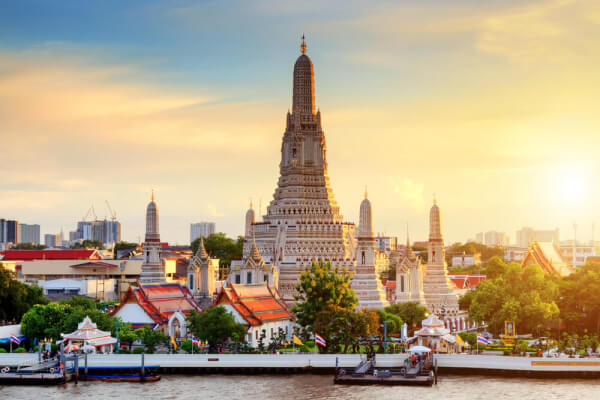Best Time to Visit Thailand from New Zealand: What to do, weather, visas, and more
Wondering when the best time to visit Thailand from New Zealand is? Learn more about weather, seasons and what to do throughout the year in Thailand.

Planning an adventure to Thailand? You’re in good company. Bangkok was once again declared the world’s most visited city in 20251.
With the bustling capital and other hotspots in Chiang Mai and Phuket having so much to offer, it’s no surprise that around 40,000 New Zealanders make the journey every year.
Whether you’re planning to work, study, visit family, or simply explore Thailand’s stunning mountainous landscapes and vibrant culture, this guide will help you prepare for the trip. We'll also introduce the Wise travel card – your perfect companion for managing expenses on your travels abroad. Wise offers the mid-market exchange rate with no markups and transparent fees to help save on international transactions.
| Table of contents |
|---|
New Zealand is one of 93 countries that enjoy visa exemptions in Thailand2. You can visit for up to 60 days for tourism purposes and extend it once while you are there for a further 30 days. The extension is at the discretion of immigration officers.
There was also a new travel requirement introduced in 2025. Every visitor must now complete a Thailand Digital Arrival Card (TDAC)3.
Thailand’s visa-free restrictions are quite relaxed compared to other countries. Anything tourist-related qualifies. You can explore temples, partake in mountain hikes, and briefly visit friends and family for 60 days just by presenting your NZ passport on arrival.
The visa exemption even includes ‘urgent work’ and ‘ad-hoc work’. Thai immigration authorities define these as 16 types of work, including organising conferences and conducting academic lectures. However, you do need to notify a registrar at the airport on arrival and any work must be completed within 15 days2.
There are a few other ‘non-immigrant visa’ types you can apply for if you want to stay in Thailand for other purposes.
There’s also a Destination Thailand Visa (DTV) designed specifically for ‘digital nomads’, freelancers, and remote workers. This is valid for 5 years, allowing NZ citizens to enter multiple times with a maximum stay of 180 days per entry.
If you aren’t a NZ citizen but have a residence permit, you will need to check the visa requirements based on the country you hold a passport with. In addition to a lengthy visa-exemption list, Thailand allows foreign nationals from 31 countries to get a visa on arrival (VoA). This is valid for a shorter, 15-day stay2.
Check the official exemption list from the Royal Thai Embassy in Wellington for clarity on visa requirements.
Thailand switched to an e-visa system for all visa applications in 20244. You will need to create an application account on the official e-visa website and then submit your details and documents.
If you’re a NZ citizen and going purely for tourist purposes, you won’t have to apply for a visa beforehand due to the visa exemption.
For other forms of e-visa, here’s a step-by-step guide for the process:
There are currently no direct flights from New Zealand to Thailand. To get to your destination, you can depart from Auckland and then hop on a connecting flight at cities including Hong Kong, Kuala Lumpur, Melbourne, Singapore, and Sydney.
Airlines that operate between NZ and Thailand include:
One of the fastest routes involves flying from Auckland to Singapore, where there is a short layover before travelling to Bangkok. This takes roughly 15 hours. Most one-stop flights take between 15 and 20 hours depending on the layover, so be prepared for a long trip.
Thailand operates two channels at customs: green and red5. You can skip to the green, Nothing to Declare lane if you aren’t bringing in any prohibited or restricted goods and don’t need to pay duty on any items. However, you’ll need to go to the red lane if you do have goods to declare.
There is a familiar set of goods you can’t import or need a permit for6. These include:
You can bring quite a bit of currency, though. You won’t have to declare anything up to the equivalent of 20,000 USD and 500,000 THB7. Read our guide on taking cash in and out of Thailand for a detailed break-down on the rules for declaring money.
Other duty-free allowances include:
When travelling to Thailand you need a few essential documents to smooth your passage into the country. Don’t forget to pack these into your rucksack, ready to present on arrival:
While not a physical document, travellers must complete the Thailand Digital Arrival Card (TDAC) online within 72 hours before arrival in Thailand.
After readying your essential documents, it’s time to start sorting some day-to-day services and items that will make your stay in Thailand easier and more enjoyable.
Most NZ networks offer international roaming for data usage abroad. Spark, for instance, allows customers to purchase a 14-day ‘roaming data pack’ for a 4G service in Thailand with 2GB of data8. It costs 25 NZD. This might be ideal for one or two-week holidays, but costs can spiral over longer stays.
If you are worried about the expense of roaming, you can purchase an eSIM or local prepaid SIM card. The best eSIM options for Thailand include Holafly, Airalo, DTAC, and eSIM Thailand. If you are only staying for a few days, picking up a local SIM at an airport on arrival will suffice. Both AIS and TrueMove H offer convenient 8-day plans.
Other items to pack for your trip include:
Medical treatment can be very expensive in Thailand. You should take out comprehensive travel insurance for financial protection and peace of mind for all eventualities.
Fortunately, we have a complete guide to the best travel insurance in New Zealand to help you find a policy that’s right for you.
There’s lots to see and do in Thailand. To make the most of your stay, you need to manage your finances effectively and be vigilant about exchange rates and fees.
While locals are increasingly using digital payments, cash is still widely used in Thailand13. You should always have some local currency — the Thai baht (THB) — in your wallet to pay for goods and services. Cash is often preferred by vendors, especially in temples, museums, and local markets. It’s great for tipping, too.
Be mindful of the fees when exchanging currency and drawing out money at airports, ATMs, and local booths. For some helpful tips, check out our guide to avoiding foreign ATM fees when traveling abroad 📹
When using cash, try to keep larger baht notes stowed away in a safe at your hotel or accommodation. It’s better to carry smaller denominations for everyday purchases and tipping. You should also split the money between different pockets and bags.
Google Wallet is supported in Thailand and can be used for contactless payments, but Apple Pay isn’t universally accepted10,11. Around a third of Thai citizens now pay for buses in Bangkok using contactless payments12.
You can use your NZD cards in places where card payments are accepted. However, be wary of foreign exchange fees and markups on conversion rates with your card provider9.
Using a multi-currency travel card such as Wise is an excellent alternative with transparent exchange rates and low fees. Available for residents of New Zealand and supported countries, Wise offers the mid-market rate on currency conversions, which is the usually the same rate you see on Google, ensuring that you don’t lose money to extra fees or hidden mark-ups.
Wise offers a convenient travel card and money transfer services that make managing your finances abroad a breeze. The Wise card lets you spend like a local in over 150+ countries.
Here's why Wise is a great choice for your international travels:
*Please see terms of use and product availability for your region or visit Wise fees and pricing for the most up to date pricing and fee information.
This publication is provided for general information purposes and does not constitute legal, tax or other professional advice from Wise Payments Limited or its subsidiaries and its affiliates, and it is not intended as a substitute for obtaining advice from a financial advisor or any other professional.
We make no representations, warranties or guarantees, whether expressed or implied, that the content in the publication is accurate, complete or up to date.

Wondering when the best time to visit Thailand from New Zealand is? Learn more about weather, seasons and what to do throughout the year in Thailand.

Planning a trip to Thailand from New Zealand? We reviewed the most popular options for Kiwis, comparing coverage, costs, and more.

Wondering when the best time to visit Phuket is? Learn more about weather, seasons and what to do throughout the year in Phuket.